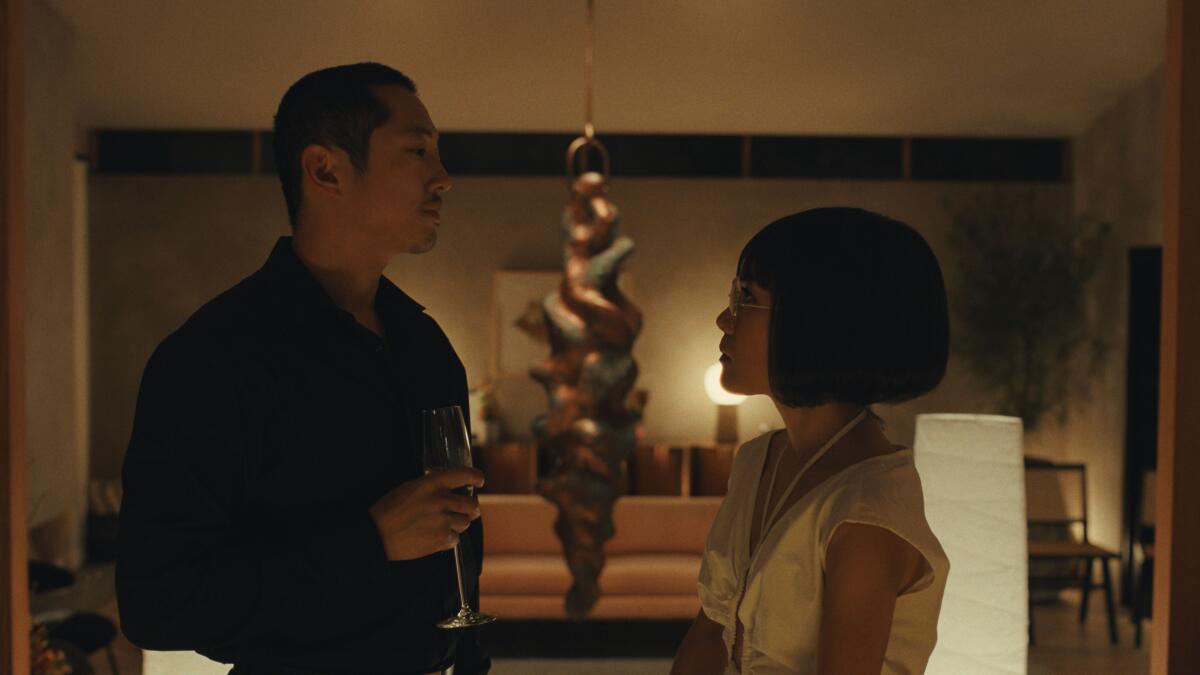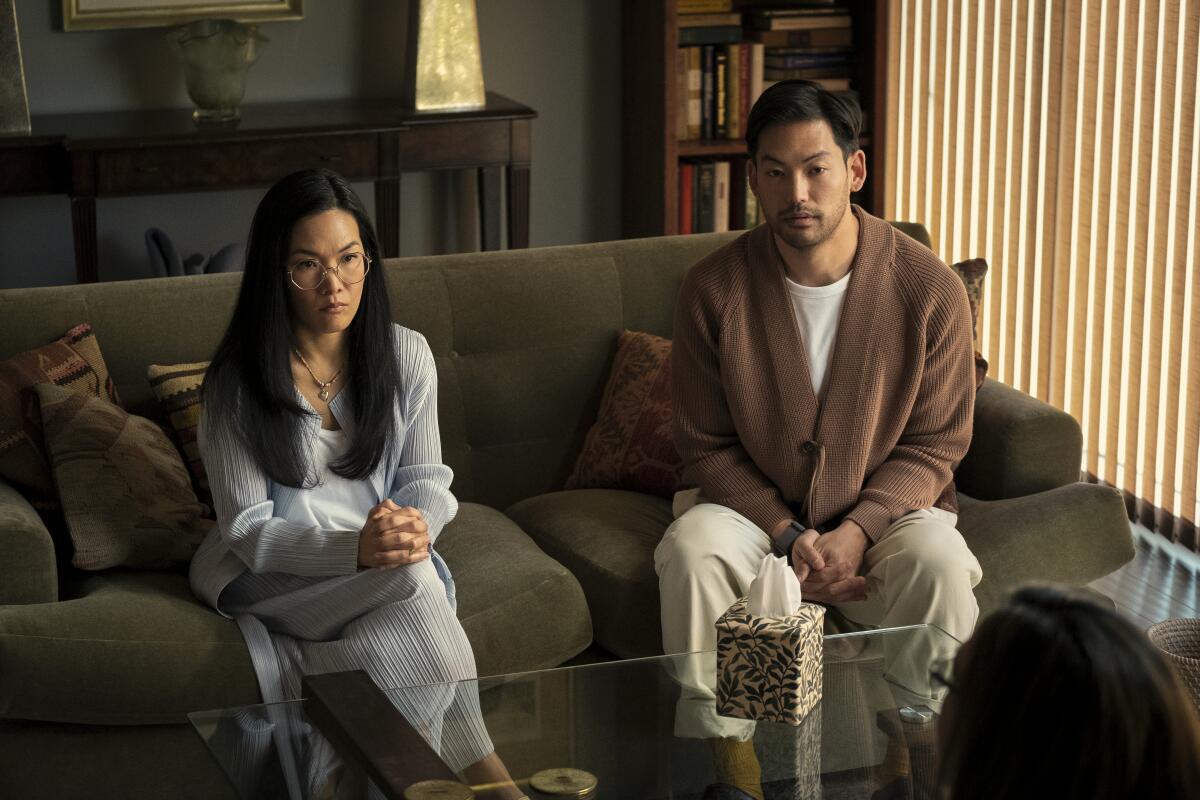How the ‘Beef’ finale uses a surreal trip to confront depression and find connection

- Share via
This article contains spoilers for Netflix’s “Beef,” including the final two episodes.
Sigmund Freud liked to say that depression is anger turned inward. In therapy, this concept often gets inverted. If depression is anger turned inward, then perhaps anger is depression turned outward. Like many early theories of psychology, this concept provides a broad oversimplification of our complex reality, but there is a nugget of truth.
In Netflix’s limited series “Beef,” two people, Amy Lau (Ali Wong) and Danny Cho (Steven Yeun), nearly crash into each other in a parking lot, setting off a chain of events that ignite a feud, which rapidly escalates. They go on to spectacularly sabotage their lives. When we first meet them, Amy and Danny appear to be very different people, but as their stories progress, it’s clear that they’re dealing with the same thing: depression. To cope with their nebulous but almost incapacitating feelings, they shift them into something tangible: unmitigated rage for each other. Anger serves as a balm for the inner conflict they can’t or won’t deal with.
The Netflix series, created by Lee Sung Jin and produced by A24, involves a life-changing road rage incident that spirals out of control.
When they begin projecting their problems onto each other, Amy and Danny begin to move through their lives with ease. Amy closes a big business deal — selling her company Koyohaus to Jordan Forster (Maria Bello), the owner of a big-box store chain — and Danny finds the resources, though ill-gotten, to reenergize his construction company. They’ve found a coping mechanism, but it’s not a healthy or sustainable one. The externalization of their depressive symptoms leads to some dark places as a result of Amy and Danny’s ongoing beef: Amy’s young daughter, June (Remy Holt), is placed in danger several times, Danny’s brother Paul (Young Mazino) almost dies, and Jordan is killed. Once it seems they’ve lost everything, they run each other off the road, putting their lives at risk.

In therapy, people need other people to heal, and “Beef” illustrates this in the final episode by trapping Amy and Danny together in a situation where they need to depend on each other for survival. The two enemies are trying to get back to civilization, and with no food, except for a bag of Skittles, they decide to pick and eat some berries that turn out to be psychedelic. Fueled by the psychedelic trip brought on by the berries, the two realize that they are experiencing the same internal strife, and they begin to come to a mutual understanding.
As the trip begins, Amy and Danny lob transient thoughts back and forth. They lose track of time and space. At one point, Danny believes that a person is coming to save them, muttering, “Thank you, thank you so much.” It’s Amy, wandering back to him through the scrub; it turns out that they’re there to save each other.
The evening progresses, and the pair start to communicate openly. Danny shares that he was suicidal the day that they first encountered each other, and Amy counters with the heartbreaking admission that she doesn’t want anyone to see who she really is: someone who is not worthy of unconditional love. As the psychedelic berries begin to break down their respective egos, the screen juxtaposes images of Danny and Amy, illustrating that they’re operating on a deeper level of understanding.
Part of this stems from their shared experience of intergenerational trauma. Danny suggests that the concept of having children works much the same as “piss and s—,” with parents “pissing their trauma down” to their children. He’s not totally off base here, and Amy agrees with him. However, Amy also tells Danny that she thought her daughter, June, would be the answer to all of her problems. Only now, lost in the dark with her enemy, does she realize that putting that pressure on poor June may have caused damage to her little psyche, perpetuating the cycle of trauma even further.
Intergenerational trauma is a common experience, but the way in which it manifests for people differs. As they sink further into their trip, Amy and Danny begin to realize that they have similar inner emotional lives, and they are experiencing depression as an “empty but solid” feeling in their bodies. The camera pans down from above, hovering over the two figures as the audio meshes their voices into a single sound. We’re not too sure who’s talking, and Amy and Danny aren’t, either. Bonded by the relief of finding another person with whom to share their feelings, they are willing to see the world from each other’s perspective.
Wong and Yeun do great work here, effortlessly adopting the mannerisms of their counterpart while also maintaining a connection between the characters that feels raw, real and unbroken. In this moment, “Beef” circles back to a concept that it teases throughout the series — the more you try to hold on to something, the faster it slips away. As the camera slowly pans into the leaves and dirt on the ground in the small space between Amy and Danny and their transcendental connection — an abstract image seen in previous episodes — we’re given hope that this moment might just carry over into something lasting for both of them. The show signals that if anger is depression turned outward, then one of the first steps to catharsis is reconciling with yourself.
Qualey is a licensed therapist specializing in addiction and trauma with more than a decade of experience in the field. She also works as a freelance writer, often focusing on the intersections among mental health, addiction and pop culture.
‘Beef’
Where: Netflix
When: Anytime
Rating: TV-MA (may be unsuitable for children younger than 17, with advisories for violence, sex and coarse language)
More to Read
The complete guide to home viewing
Get Screen Gab for everything about the TV shows and streaming movies everyone’s talking about.
You may occasionally receive promotional content from the Los Angeles Times.







